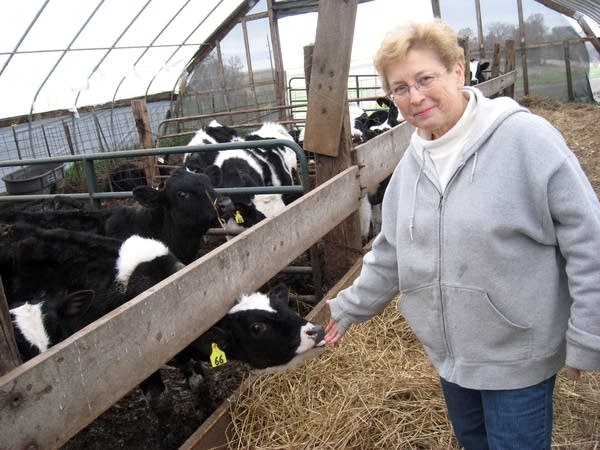As need returns, so do farm crisis hotlines
Go Deeper.
Create an account or log in to save stories.
Like this?
Thanks for liking this story! We have added it to a list of your favorite stories.

In rural areas across the country, crisis hotlines have returned, taking calls from a new generation of troubled farmers.
It's reminiscent of the 1980s, when farm foreclosures were rampant. Now, anxiety is on the rise as the high commodity prices of a few years ago are gone.
Minnesota launched a hotline this month to help farmers feeling the financial and psychological impact of the tough times.
Mary Waldo, who runs a dairy farm with her husband Charles in southeastern Minnesota, is feeling that impact.
Turn Up Your Support
MPR News helps you turn down the noise and build shared understanding. Turn up your support for this public resource and keep trusted journalism accessible to all.
The farm has been in her husband's family for six generations. And while Waldo says she loves her farm, the stress of it all is agonizing at times.
"Farming is stressful, no matter what's going on," she said. "You've got your weather, and you got to sell your crop or sell your product. I live it every day, what farming is like. It's hard. It's a hard life."
Waldo says all the dairy farmers she knows are struggling. She and her husband cope by talking about it with each other, and with their friends.
"You do need to trust in God, say a lot of prayers, and keep in touch, talk to other people. Because you're all in the same boat," said Waldo.
"If the farm fails, there's a sense that you're failing the three or four generations before you."
The Waldos have a support network that keeps them strong. But most farmers don't want to talk about the stress. And they won't admit they've called a crisis line -- even though for the first time in decades, more farmers are picking up the phone to ask strangers for help.
Crisis hotlines have seen a spike in calls since last fall, when pork and dairy prices began to collapse.
"We have documented where these calls are coming from, and they're largely from dairy producers, swine or pork producers, and then people impacted by weather events," said Mike Rosmann with the Iowa-based AgriWellness, the nation's largest network of crisis hotlines for agricultural workers.
The non-profit works with farmers in seven states, including Minnesota.
Rosmann says callers speak of everything from foreclosures to dwindling savings accounts. The network has seen an increase in calls from 22,000 to about 26,000 in the last year. That's an 18 percent increase.
Many of the calls this year have come from dairy producers in Wisconsin, southeastern Minnesota and parts of Iowa, who have seen their operations crippled by plunging milk prices. Many are in danger of shutting down.
Rosmann says the stress adds up. It often leads to depression, and that's leading more farmers to suicide.
"There is an increase in suicides in areas of the country that are experiencing the higher unemployment rates. That unemployment syndrome occurs among farmer people in an especially dramatic fashion, because of the potential loss of the land," said Rosmann.
In 2007, the top 10 counties with the highest suicide rate in the state were all in greater Minnesota, outside the Twin Cities metro area, according to the state Department of Health.
It's hard for farmers in these areas to get help. Fewer than 1 percent of the state's 620 licensed psychiatrists practice in a rural county.
To help farmers in crisis, Minnesota launched a Farmer Assistance Network earlier this month. It's modeled after the Farm Advocate Program that began during the farm crisis of the 1980s. Part of the network includes confidential crisis counseling.
But talking about anxiety and stress is not always easy for farmers. There's still a strong stigma associated with mental health issues in smaller communities. And some farmers are simply too busy to step away from the farm to seek help.
David Therkelsen is with Crisis Connection, a hotline in Minnesota geared toward agricultural communities. He says many farmers see losing a farm as the ultimate failure.
"Any of us can fail at our work. Any of us can lose our job and have financial and self-image trauma that goes along with that," said Therkelsen. "But in farming, if the farm fails, there's a sense that you're failing the three or four generations before you who had the farm, and maybe the generations that would follow you that you expect would keep the farm."
Farm advocates around the nation are lobbying federal officials to provide funding for the Farm and Ranch Stress Assistance Network. It was adopted by Congress as part of the 2008 Farm Bill, and mandates a national hotline network and more services for agricultural areas.
In the meantime, mental health experts in the region remain watchful as farmers continue to work around the clock, to try to harvest their remaining crop before winter.
Dear reader,
The trustworthy and factual news you find here at MPR News relies on the generosity of readers like you.
Your donation ensures that our journalism remains available to all, connecting communities and facilitating better conversations for everyone.
Will you make a gift today to help keep this trusted new source accessible to all?




